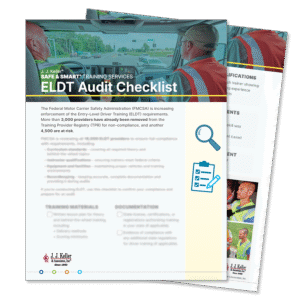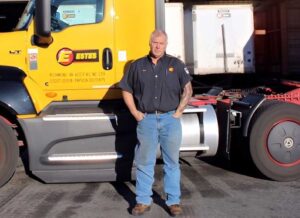We’ve all seen them: the screaming billboards along America’s highways promising justice — and a big check — following a traffic accident involving a big rig, or the sleazy late-night commercial asking, “Have you been injured by a trucking company’s carelessness?”
Such advertising efforts by the lawsuit industry have become so common, not to mention lucrative, that it has almost become passé — even though any of those massive settlement checks could be the death-knell of all but the very largest trucking companies coast to coast.
Dr. Alix Miller, president and CEO of the Florida Trucking Association (FTA), is well-versed in the ways of the personal injury world. Florida has long been considered ground zero for such litigation.
“Take any drive down an interstate in Florida, or any other side road, and you will see billboard after billboard after billboard, usually with a giant truck on them,” she said. “We are the industry that personal injury attorneys, especially the nefarious ones, have been targeting for many, many years.”
Given this, it seems fitting that the latest win in the continuing battle for meaningful tort reform took place in the Sunshine State. Last year, the FTA saw its sweeping bill, HB837, signed into law by Gov. Ron DeSantis, ushering in major changes to the state’s civil litigation statutes.
Adoption of the new state law represented the end of a long campaign, and the thrill of the win still rings in Miller’s voice.
“Most people say, ‘Look, the trucking association got comprehensive tort reform in three weeks.’ And I always respond that it took 20 years and three weeks,” she said.
“We came up with a formal strategy three years ago,” she explained. “We knew the time was not right in 2020. It wasn’t right in 2021. It wasn’t right in 2022. But that didn’t stop us from preparing for 2023, when we thought the stars might align with leadership and support from the governor.”
Some of the more notable changes the bill brought into law include protecting small businesses from paying massive damages when they are not primarily at fault. Under the old law, companies could be pressured to settle even if evidence showed the plaintiff was 99% to blame for the event. Another change is the elimination of one-way attorney fee shifting, which allowed plaintiffs’ lawyers to recover attorneys’ fees without paying defendants’ costs after filing abusive lawsuits.
Signage of the bill was a victory felt both inside and outside of the trucking industry. In fact, the U.S. Chamber of Commerce called it “the biggest legal reform bill in decades” in a 2024 report detailing legal reform measures passed in the previous year.
“Obviously, this is a significant problem,” Miller said. “There are significant problems in many states — some worse than others. Before 2023, Florida was one of the worst.”
Tort reform is a state-by-state issue, but all tend to have the same goals in common, such as eliminating spurious lawsuits and limiting so-called nuclear verdicts, a term applied to judgements $10 million and up. Such reforms are often difficult to pass on emotional grounds since the level of damage resulting from an accident involving a semi accident tends to be prejudicial to lawmakers over determining who was actually at fault.
Miller says that, while huge awards tend to attract the most headlines, a runaway system that allows multiple smaller awards is just as damaging to the financial health of the industry.
“It’s about the settlement mills, that’s what we call them,” she said. “People talk about a nuclear verdict putting a trucking company out of business, and of course many will, but when you have most trucking companies at 20 trucks or less, just a couple of settlements are going put a trucking company out of business.”
Rob Moseley, founding partner of South Carolina-based law firm Moseley Marcinak Group, says there’s another concern to consider, regardless of judgement size.
“I think that it’s more likely to put somebody out of business, not because they get hit with a verdict as much as they can’t afford the insurance because of where the market is,” he said.
“The odds of you getting hit with some sort of huge award are not that great, but the odds of having to pay a lot for your insurance are 100%,” he continued. “I think that’s a bigger issue than anything else. The verdicts are driving insurance costs up so much that we’re seeing those types of issues.”
Moseley, who’s handled cases for transportation industry stakeholders for more than 30 years, says variances in legal statutes from place to place will continue to make tort reform a matter for the states, although there are federal measures that could also help.
He believes broadening federal jurisdiction to allow cases involved in interstate motor carriers to be brought in federal court would be a good start. Until that happens, the issue lies in state legislatures’ hands. On this front, Moseley says he’s seen good progress in many areas of the country.
“West Virginia’s legislature passed a cap on damages. Wisconsin’s legislature passed a cap on damages, even though the governor vetoed it,” he said. “We have had some significant changes in Iowa and Florida and Texas in the last few years. Those have been some good things.
“We absolutely need to continue this state-by-state tort reform to put the brakes on these big judgements — no pun intended,” he noted. “Something’s gotta give whether it means your products in the store costing double because it costs that much to get them there or something else. Interstate commerce can’t withstand this continuing barrage of large verdicts.”
Dwain Hebda is a freelance journalist, author, editor and storyteller in Little Rock, Arkansas. In addition to The Trucker, his work appears in more than 35 publications across multiple states each year. Hebda’s writing has been awarded by the Society of Professional Journalists and a Finalist in Best Of Arkansas rankings by AY Magazine. He is president of Ya!Mule Wordsmiths, which provides editorial services to publications and companies.














